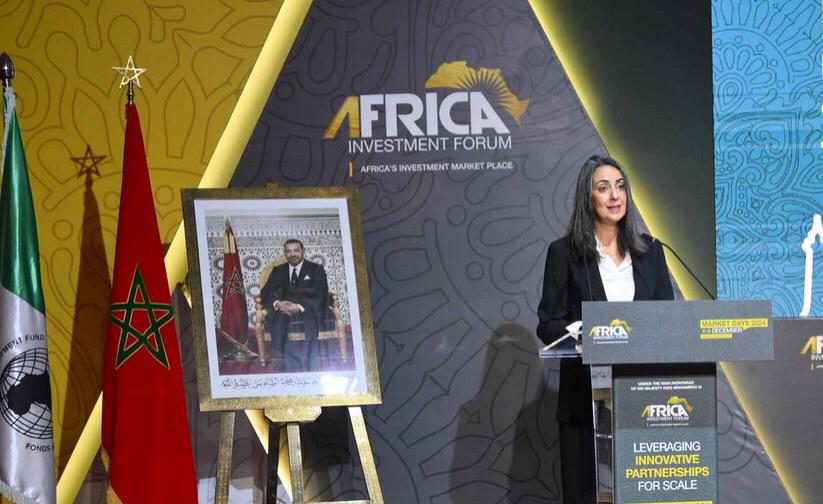
Africa Investment Forum 2024: Leveraging Innovative Partnerships for Scale
The Africa Investment Forum (AIF) 2024, held in Morocco under the theme “Leveraging Innovative Partnerships for Scale,” showcased Africa’s potential as a prime investment destination while addressing critical challenges. With a diverse assembly of leaders, financial institutions, and private sector players, the forum underscored the transformative power of partnerships in achieving sustainable economic growth across the continent.
Hospitality and Ambition: Morocco Sets the Stage
Morocco, renowned for its warm hospitality, welcomed participants with open arms, embodying the spirit of collaboration that defined the forum. The event began with accolades for His Majesty King Mohammed VI and his vision of a prosperous Africa driven by strategic alliances. The country’s geographical positioning and policy of fostering “win-win alliances” made it an ideal host for this significant gathering.
The forum also coincided with the 60th anniversary of the African Development Bank (AfDB), a testament to decades of commitment to Africa’s economic and social progress. Its president, Dr Akinwumi Adesina, set the tone for the discussions, describing Africa as the most critical space for global growth. “Africa’s potential is not just a narrative; it’s an inevitability,” he declared.
The Case for Africa: Unparalleled Investment Opportunities
Africa’s demographic growth, expanding middle class, and abundant natural resources position it as a lucrative market. By 2050, one in four people globally will be African, a demographic shift that investors cannot ignore. Moreover, Africa’s food and agriculture market is projected to reach $1 trillion by 2030, while infrastructure demands present a $70 billion annual investment opportunity in sectors such as energy, water, and transport.
The forum highlighted critical data points reinforcing Africa’s appeal:
– A 2024 survey by the African Private Equity and Venture Capital Association revealed that 85% of investors plan to increase allocations to Africa within two years.
– Africa holds the world’s largest reserves of key minerals such as chromium (95%), cobalt (66%), and platinum group metals (90%), essential for the global energy transition.
These factors, combined with Africa’s low infrastructure default rate (1.9%, compared to 6.6% in North America), underscore the continent’s investment viability.
Green Growth and Critical Minerals: The Energy Transition Opportunity
Africa’s role in the global energy transition took centre stage, with discussions focusing on its vast reserves of critical minerals. For instance, lithium, cobalt, and manganese are vital for batteries used in electric vehicles and renewable energy storage. Countries such as the Democratic Republic of Congo offer competitive advantages in processing these materials, with production costs up to three times lower than in the United States or China.
Dr Adesina stressed the need to move up the value chain, transitioning from raw material supplier to producer of value-added products. The Alliance for Green Infrastructure (AGIR), launched by the AfDB, aims to mobilise $10 billion for green infrastructure projects. Similarly, the AfDB’s issuance of hybrid capital bonds, which were oversubscribed by eight times, highlights investor confidence in Africa’s green ambitions.
Overcoming Perception: Addressing Risk and Unlocking Capital
One of the forum’s recurring themes was the disparity between perceived and actual risks associated with investing in Africa. While investors cite market, political, and financial risks, data from Moody’s Analytics showed that Africa’s default rates on infrastructure projects are the lowest globally. This finding challenges outdated narratives that deter capital flows.
To bridge the gap, institutions such as the AfDB provide risk mitigation instruments such as partial guarantees. Moreover, asset recycling strategies—where governments monetise existing assets to fund new ones—are gaining traction. These initiatives aim to de-risk investments and create smoother entry points for global capital.
Scaling Through Partnerships: Collaboration as a Catalyst
The forum demonstrated the tangible impact of collaborative initiatives. A standout example was the Africa Infrastructure Acceleration Fund, which secured $500 million from 15 institutional investors. Partnerships with multilateral development banks, private equity firms, and trade organisations are catalysing projects that otherwise would remain unviable.
Several innovative models were discussed:
– The Arab-Africa Trade Bridge, launched under King Mohammed VI’s patronage, is enhancing trade flows between regions.
– A medical excellence project with King’s College London aims to stem the outflow of African healthcare talent and patients, redirecting resources to local solutions.
– The global green bond initiative, supported by European partners, seeks to expand sustainable finance in African economies.
Challenges Ahead: Closing the Infrastructure Gap
Despite progress, Africa faces a significant annual infrastructure investment gap of $170 billion. This shortfall limits economic growth and exacerbates social inequalities. The AIF emphasised the need for speedier decision-making in project approvals and stronger integration of public and private efforts.
Credit rating discrepancies and high borrowing costs remain barriers. On average, it costs three to four times more to raise capital in Africa than elsewhere. Establishing a pan-African credit rating agency could provide more equitable assessments, aligning perceptions with reality.
A Call to Action: The Future of African Investment
As the forum concluded, the message was clear: Africa is open for business. Its unique combination of resources, demographics, and market opportunities presents unmatched potential for investors willing to partner strategically. However, success hinges on shifting mindsets, strengthening partnerships, and accelerating innovation.
Dr Adesina’s optimism was echoed by participants who recognised the forum’s role as a transformative platform. As one attendee noted, “AIF is not just about dialogue; it’s about action. Each project approved here moves us closer to a prosperous Africa.”
Africa’s investment narrative is evolving, shaped by forums such as the AIF and the partnerships it fosters. As the world increasingly looks to Africa for solutions, leveraging innovative collaborations will be the cornerstone of its rise. The stage is set, the opportunities are vast, and the time to act is now.
In the words of Dr Adesina: “Believe the data. Believe in Africa.”
Aric Jabari is a Fellow, and the Editorial Director at the Sixteenth Council.



